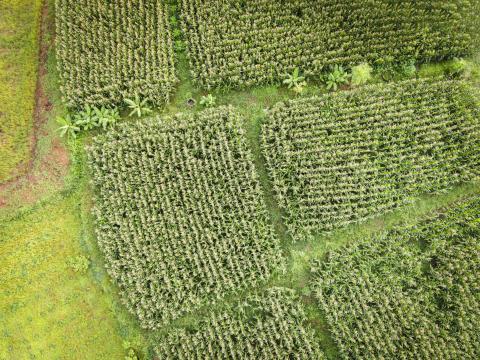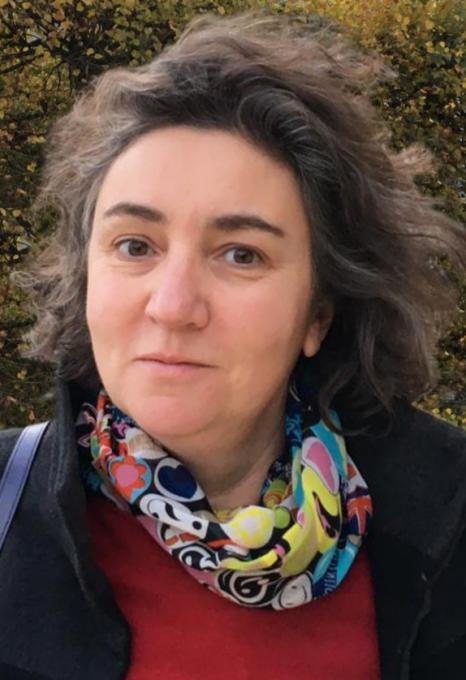
Stéphanie Baumberger: Developing products from agricultural activity
Stéphanie Baumberger is a professor of green chemistry at AgroParisTech and leads the Apsynth research team at the Institut Jean-Pierre Bourgin (IJPB – Univ. Paris-Saclay, INRAE, AgroParisTech). A specialist in lignins, she is interested in the structure and properties of plant polymers. It is in this context that she is developing an integrated approach to developing products from agricultural activity.
Following a 2-year preparatory course for the competitive exam in biology and after training as an engineer in the agri-food industry sector at ENSIA, Stéphanie Baumberger decided, towards the end of the 1990s, to focus on a PhD investigating the development and characterisation of composite materials combining starch and lignin - two polymers derived from agricultural activity. Her work demonstrated that it is possible to exploit the hydrophobic character of lignins to control the biodegradability of starch films for packaging. “Although my studies as an undergraduate focused on food science, I became interested in the non-food uses of products from agricultural activity in the context of this thesis and concentrated on understanding the structure-function relationships of biopolymers,” explains the academic staff member. This pioneering work proved to be a pivotal point for Stéphanie Baumberger as from then on she decided to focus her teaching and research on the development of products from agricultural activity.
Alongside her PhD, she started working as a contracted teaching and research associate at the Paris-Grignon National Institute of Agronomy (INA P-G) where she developed new courses, including a field-based course located in Champagne-Ardenne. Very quickly, she became interested in the benefits of creating links between research and teaching, so she applied for and obtained the position of lecturer at INA P-G in the year 2000. In terms of both research and teaching, she continued to develop her expertise in the field of the non-food uses of products from agricultural activity, making a key shift in focus to biorefineries. In 2013, she obtained a professorship in green chemistry at AgroParisTech.
The ZELCOR European project - a springboard to the ‘Les étoiles de l’Europe’ (Stars of Europe) award
In 2013, Stéphanie Baumberger also decided to take on a new direction and establish herself at European level. In 2016, thanks to a collaborative project involving public and private stakeholders, she obtained funding from the European Union for the ZELCOR project. It involved 17 partners and its goal was to transform biorefinery waste from wood and straw into high value-added bioproducts for the plastics, cosmetics and chemical industries. “While my team's work was initially based on the recovery and reuse of waste from the paper industry, thanks to the many discussions we’ve had with manufacturers wishing to use safe bioproducts, we’ve been able to move towards a green chemistry approach which took environmental constraints into account."
While these partnerships with industry representatives have enabled the ZELCOR project to produce applied results which have met the expectations of the socio-economic world, it has also generated a great deal of scientific knowledge. Around twenty articles have been published in international journals in the areas of biotechnology, sustainable chemistry and materials science. “Balancing the search for applied results with the development of more fundamental knowledge is a driving force for the team. We are meeting this challenge thanks to the state-of-the-art analytical tools (NMR, mass spectrometry, modelling) available to us at IJPB. In this way, we’re able to suggest an innovative process for the production of antioxidants of natural origin based on the use of ionic liquids while unravelling the molecular mechanisms of lignin depolymerisation,” explains Stéphanie Baumberger. This unique approach and the results obtained earned her, as coordinator of the ZELCOR project, the special jury prize in the 2021 ‘Les Étoiles de l’Europe’ (Stars of Europe) award.
Innovative teaching: working towards ever greater interculturality
Alongside her research work, in the middle of 2010, Stéphanie Baumberger decided to embark on the creation of a European Master’s. She was already managing the ‘Biorefinery - Green chemistry’ course at AgroParisTech when she embarked on the creation of an Erasmus + training programme in bioeconomy together with the course’s teaching team and the department's Europe Unit. She obtained funding for the project in 2019 and the Erasmus Mundus Bioceb Joint Master was born. “After having carried out my research at a European level, I really wanted, as far as teaching was concerned, to move towards increased interculturality and to offer innovative teaching formats which enabled students to be exposed to a greater range of approaches and methods."
The Bioceb Master’s is jointly coordinated by AgroParisTech and Université Paris-Saclay in partnership with the University of Liège, the Tallin University of Technology (Estonia), Aalto University (Finland) and Université de Reims Champagne-Ardenne. It welcomed its second cohort of students in 2021. Through a two-year international exchange programme, students are prepared for the global challenges of the bioeconomy and benefit from a teaching approach based mainly around projects. “It gives me great pleasure to see some of my students contributing to the various research programmes underway in our fields and achieving their career goals internationally."
Interdisciplinarity, cooperation and partnerships as a common thread
Throughout her research and teaching, Stéphanie Baumberger has always focused on building bridges and encouraging cooperation. “I strongly believe in the benefits gained from breaking down barriers, whether between disciplines - as in my research team where organic chemists, physical chemists and biochemists work together - or between academic researchers and manufacturers in the context of jointly created research projects, or just simply between cultures within international programmes. I’m convinced that it’s by strengthening this dialogue and this openness that in future we’ll be able to open up new research avenues and prepare our students better for the problems they see in the world around them,” adds the researcher, who does not shy away from introducing theatre workshops into her science courses.
The desire to disseminate knowledge
After ten years involved in the creation and coordination of projects at a European level, Stéphanie Baumberger is more interested than ever in ‘disseminating knowledge’ in every way possible. “I’d like to spend more time supporting my students in the development of their careers by exploiting the international network involved with the Master programme and the many associated strategic partners in particular. I’d very much like to set up co-supervised PhDs with non-European partners to work on the exploration of diversified agricultural and forestry resources. It’s important to ensure a smooth handover to the young researchers in my team as regards project development and coordination. They’d benefit from my expertise in the field and it would free up my time for another of my passions, - the enhancement of knowledge,” adds the researcher.
Stéphanie Baumberger coordinated a book which was published in 2020 with the title Chimie verte et Industrie agroalimentaire (Green chemistry and the agri-food industry). She was a finalist for the Roberval prize and is now fully embracing her desire to write. “With 30 years of research and teaching under my belt, I feel ready to use my experience to communicate more and to contribute to the dissemination of knowledge,” says the research professor in conclusion.
